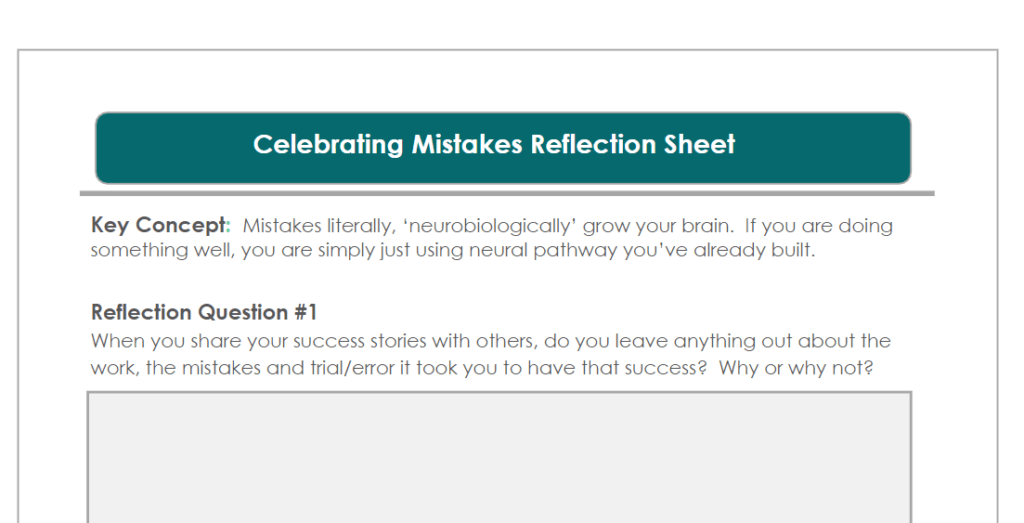Growth Mindset and Mistakes
Key #2: Celebrate Mistakes
We know from research that mistakes literally grow your brain.
Electrical activity called the ERN response occurs when the brain appears to experience a conflict between an error and the correct response. We do not even need to be aware that we made a mistake – we just have to make it.
According to Stanford Mathematics expert Jo Boaler, we do not actually need to be aware that we have made a mistake. It seems as though simply because it is a time of struggle, the brain grows from this challenge.
Environments that are “mistakes friendly” also increase student effort on tasks.
A study by Steuer and colleagues found that classroom environments that were seen as “mistakes friendly” led to students increasing their effort in their work.
References:
Boaler, J. (2014). The Mathematics of Hope, Heinemann
Boaler, J. (2015). Mathematical Mindsets: Unleashing Students’ Potential Through Creative Math, Inspiring Messages and Innovative Teaching. San Francisco, CA: Jossey-Bass.
Moser, J. S., Schroder, H. S., Heeter, C., Moran, T. P., & Lee, Y. H. (2011). Mind Your Errors Evidence for a Neural Mechanism Linking Growth Mind-Set to Adaptive Posterror Adjustments. Psychological Science, 0956797611419520.
Steuer, G., Rosentritt-Brunn, G., & Dresel, M. (2013). Dealing with errors in mathematics classrooms: Structure and relevance of perceived error climate. Contemporary Educational Psychology, 38(3), 196-210.
[tab:EXTRA RESOURCES]
If you’re creating something new, you will make mistakes! Otherwise you’re just doing something you already know! (this also goes for teachers trying new things)
Download the Celebrate Mistakes Graphic
There’s a lot of confusion and controversy over this one.
When we say ‘celebrate mistakes’, we don’t mean…
“Oh, you added 1 + 1 and got 3 again? GREAT!! Just keep working hard!”
We mean…
“Oh, you added 1 + 1 and got 3 again? Lets reflect on how we go to that answer. Lets see if we can find a new way to learn this.”
If someone is repeatedly adding 1 + 1 and getting 3, they are not learning – meaning, there is a goal in mind and they are working hard, but still not understanding the principals of what it is they are learning.
Yes, there is brain growth because it means they are leaving their ‘myelinated territory’, (which means some new brain areas have sparked)…
BUT… it also means that if they keep using the exact same process, if the teacher just keeps explaining it the same way over and over… they are not learning how to learn.. they are just repeating a misunderstanding.
There needs to be
– a reflection on how they got to that answer, and
– some type of ‘PIVOT’…
PIVOTING
What I mean by this is, if they added 1 + 1 and got 3 the first time, there needs to be some type of adjustment, not just saying ‘great, you made a mistake’ and making no changes at all to how they got there. For example, maybe that person needs to:
…go more SLOWLY
…perhaps they need some physical objects to see the actual principal of reality that is being symbolized by math
…maybe an analogy will help (in fact, studies show that when analogy and metaphor are used to explain something, comprehension can go up by as much as 3000%… that wasn’t a typo.. three thousand percent increase in comprehension.
P.S. – “Slowly” is a much more effective word than ‘carefully’… slowly is something we can actually control with our motor movement. Carefully is more of an intangible idea.
PPS- Slow math is much more effective than the US-style of speed: see Stanford’s youcubed.org for more).
What I am saying is, this is not just cheerleading… this is about understanding that MISTAKES HELP US PIVOT….
‘Pivoting’ leads to brain growth. Adjustments and refinements require new neuronal connections.
Here is the Khan Academy’s video about mistakes growing your brain.
When we help someone re-frame that a mistake grows their brain, instead of having an anxiety attack because they have been trained that ‘mistakes’ are bad… this re-framing will help their frontal brain areas stay online so that they can actually increase their own self-awareness about the processes they use to get different results
That way, they can start to see which processes work best for them and which ones don’t.
And that happens to be the topic of the next unit: ‘process and micro-progress’.
So get know mistakes well.. really, truly understand what they represent – that they are not ‘bad’… and then post these phrases on your desk, in your staff room or at home!
[tab:REFLECTION QUESTIONS]
Reflection Questions

Download the Reflection Questions
Thanks for joining me for Unit 3! Next up: Unit 4 – Micro-Progress
Unit 3
